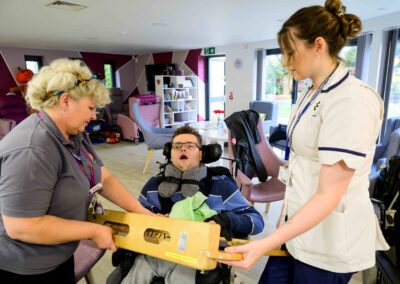Providing Hospice care, everywhere
If you heard the word Hospice what would you think of? A building? A place people to go die? In reality a Hospice is about care and support, which is provided not only in the Hospice itself, but also in the community and in patients own homes.
In fact, two thirds of St Elizabeth Hospice’s patients are currently cared for outside the Hospice.
For a lot of patients it is their wish to be cared for by the Hospice at home, and when the time comes, to die at home, in the place they feel most safe – and St Elizabeth Hospice’s staff do everything they can to make that happen where possible.
The Hospice has three community nursing teams who care for patients in the community, in nursing and residential homes, and in the patient’s own homes, throughout the stages of their illness.
The Community Clinical Nurse Specialists are often there at the beginning, carrying out initial assessments to new patients referred to the Hospice, to help them manage their illness as best as possible.
They refer the patients and families to other services within the Hospice if needed and act as a liaison with other relevant organisations to ensure the patient and their family have the support they need.
Hospice at Home nurses are available 24 hours, seven days a week and are there to help if there’s a crisis. They also manage the busy OneCall adviceline, offering expert advice and support to patients, carers and healthcare professionals.
At any time of day or night, if there is a problem, patients and carers can call the Hospice at Home nurses for advice, support, and if necessary, specialist nursing care and symptom control and they will help to prevent an unwanted admission to hospital or the Hospice.
Community Healthcare Assistants provide short term, end-of-life care to patients who have a sudden increase in care needs or support a discharge from the hospital or the hospice until a care package can be arranged for them.
When the team goes into a patients home it is usually for short term arrangement, until statutory services can arrange carers for the longer term or until the patient dies.
For the family of a patient who is being cared for at home, it can often be a lonely and scary time and the Hospice community nursing teams are not only there for the patients, but also to support the families.
Lesley Jefferson, Hospice at Home Team Leader, said: “Being with somebody who is dying is one of the hardest things anyone can do because you feel so helpless. We are able to provide an objective view of what is going on and we often leave with them better able to cope because we have solved the symptoms and explained the problems to them.
“Being able to listen is a huge part of the job and is so important. Sometimes patients or their families need to offload about everything that is happening to them and allowing them to do that is one of the biggest things we do.
“We can’t make what is happening right, but we can make it a little bit better.”
Linda Wilder, Community Healthcare Assistant Team Leader, agrees. She said: “A lot of what we do is supporting the carers and family members as they don’t see anybody else. As they know we’re from the Hospice they talk to us about what they’re going through and that allows us to refer them to another service within the Hospice, such as counselling or music or art therapy.
“When we go in, the patients and families often don’t want us to leave, as unlike agency staff, who have to stick to set visit time, we have the capacity to stay longer.”
Sometimes, patients don’t need care, they just need a listening ear and a friend, and St Elizabeth Hospice offers that too in the form of its Volunteer Home Sitting Service.
Volunteers, like Richard Emsden and Mary O’Sullivan, visit a patient’s home for an hour or two to keep them company and talk to them, offer a listening ear and to give their carer a break to pop out, run errands, or have some ‘me’ time.
Over the last few years the service has grown and there are now 12 volunteers giving up their time to visit a patient at home.
Mrs O’Sullivan, of Ipswich, said: “Being a home sitter appealed to me because you talk to the patient in their own home, in a non-medical setting, and they can talk about something other than their illness.
“I used to worry I wouldn’t have anything to talk to them about, but family is always a good conversation starter and you meet such interesting people, they’ve always got good stories to share.”
Mr Emsden, of Bildeston, visits three patients, he said: “I had retired and was looking for something to do and fill my time in a practical way and I stumbled across the Hospice’s advert for volunteer home sitters.
“I love it. It’s never boring and I’m always happy to go and see my patients. I’ve learnt so much, it extends your own mind into other experiences.
“It’s a lovely, privileged position to be in.”
The volunteer home sitting service is as important to the patients as it is to the carers as it allows them a much needed break for a couple of hours. Mr Emsden often takes one of his patients out for a few hours, so his wife can have some time at home to relax.
To find out more about any of St Elizabeth Hospice’s services, click here



